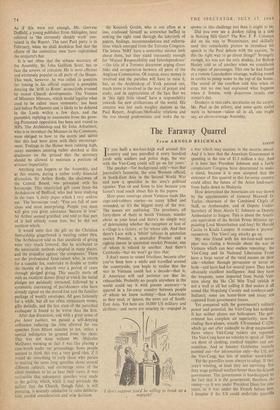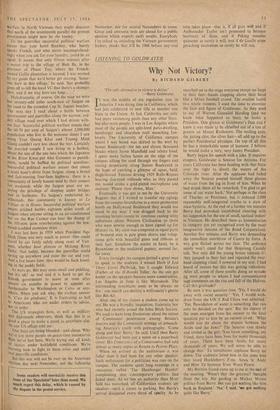The Faraway Quarrel
From ARNOLD BE1CHMAN
SAIGON
I17 you built a ten-foot-high wall around this country and you patrolled it every hundred yards with soldiers and police dogs, the war with the Viet-Cong could still go on for years.'
The speaker—'for background only'—was that journalist's favourite, the wise Western official, in South-East Asia in the Second World War and now a specialist in the area's political agonies. You sit and listen to him because you haven't read much about this in the papers.
Most press coverage about Vietnam reads like cops-and-robbers stories—so many killed and wounded, or it's the biggest story of the war. The names are confusing. The provinces, all forty-three of them in South Vietnam, wander about in your head and there's no simple way of determining whether the recapture or loss of a village is a victory, or for whose side. And then there's Laos with a 'leftist' (always in quotation marks) Premier, a neutralist Premier and a rightist (never in quotation marks) Premier, one of whom is related to another. And there's Cambodia—but we won't go into that.
I don't mean to sound frivolous, because after you've been here a while and travelled around the countryside, you begin to realise that the war in Vietnam could last a decade—that is, if American will and patience are that in- exhaustible. Probably no people anywhere in the world could say it with greater accuracy—`a quarrel in a far-away country between people of whom we know nothing'—than Americans as they read, or ignore, the news out of South- East Asia. Yet here are 16,000 US military and civilians—and more are nouring in—engaged in 1 don't .suppose you'd be willing to break up a triptych?' a war which may escalate in the months ahead. And it is here that the American Government is spending at the rate of $1.5 million a day. And it is here that President Johnson and a fairly complaisant Congress have determined to make a stand, because it is now accepted that the outcome of this quarrel in this far-away country could affect the future of the Asian land-mass, from India down to Malaysia.
How determined the Americans are was shown by the appointments of General Maxwell D. Taylor, chairman of the Combined Chipfs of Staff, as Ambassador, and of Deputy Under- Secretary of State Alexis U. Johnson as Deputy Ambassador to Saigon. This is about the Ameri- can equivalent of the British Prime Minister ap- pointing Lord Mountbatten and (say) Sir Harold Caccia to Kuala Lumpur. It remains a 'psywar' manceuvre. The Viet-Cong attacks go on.
My wise friend with his ten-foot-wall meta- phor was stating a bromide about the war in Vietnam which can bear endless repeating: the Viet-Cong and its National Liberation Front have a large sector of the rural masses on their side—whether through persuasion or terror or both—and have had for several years. They have obviously excellent intelligence. And they have the weapons, some imported from North Viet- nam along the Ho Chi Min Trail (which is not a trail at all but calling it that makes it all sound like Hopalong Cassidy and cowboys-and- Indians); some are home-brew and many are captured from government forces.
Yet compared with the government's military power and potential, the Viet-Cong has nothing. It has neither planes nor helicopters. The gov- ernment has complete air superiority, now in- cluding flare-planes, usually US-manned C-I23S, which go out after midnight to drop magnesium flares where Viet-Cong raiders are reported. The Viet-Cong have no vehicles to speak of. They are short of clothing, medical supplies and am- munition. And as Senator Goldwater recently pointed out—for information only—the US, not the Viet-Cong, has lots of nuclear weed-killer.
Yet the guerrillas seem always to adapt. If they aren't winning, at least they are surviving. For they wage political warfare better than the Khanh government. The government is handicapped by the fact that it is the government, therefore the enemy—as it was under President Diem for nine years, as it was under the French before him. I imagine if the US could undertake guerrilla
warfare in North Vietnam they might discover that north of the seventeenth parallel the present government might now be the enemy.
To the guerrillas successful political warfare means that your hotel floorboy, who barely Speaks French, and who stares uncomprehend- ingly when you ask for your laundry, could be an agent. It means that only fifteen minute § after a motor trip to the village of Binh Ba, in the Province of Phuoc Tuy, where the French- owned Gallia plantation is located, I was warned by my guide that We'd better get moving. 'Some- one herd in this village,' he said, 'has probably gone off to tell the local VC that there's a stranger here, and if we stay here too long.. ., Melodramatic, of course. On the map we were but seventy-odd miles south-east of Saigon on the road to the crowded Cap St. Jaques beaches. The next day I read about a battle between government and guerrillas along the narrow, red- dirt village road over which I had driven with- out fear. Successful political warfare means that the 60-70 per cent of Saigon's almost 2,000,000 Population who live in the noisome slums I saw along Tran Quang Khai and Truong Minh Ciang couldn't care less about the war. Certainly the married couple I saw living in a hotbox, about the size of the one into which the Japanese at the River Kwai put Alec Guinness as punish- Ment, would be baffled by political questions. Successful political warfare means that about a scant hour's drive from Saigon, along a broad and fast-moving four-lane highway, there is a community of lovely houses used by their owners for weekends while the Saigon poor are en- joying the privilege of sleeping under bridges and in hotboxes. To Saigon's embittered in- tellectuals, this community is known as Le Village de la Honte. Successful political warfare means pitched battles eighteen miles south of Saigon when anyone sitting in an air-conditioned bar on the Rue Catinat can hear the thump of the 105-mm. guns reverberating against the low, cloud-scudded monsoon skies.
I was last here in 1959 when President Ngo Dinh Diem was very much in power. One could travel by car fairly safely along most of Viet- nam, whether haul plateau or Mekong River Delta. Not today, because the guerrillas could spring up anywhere and mine the car and you. And a few hours later, they would be back kneel- ing in the paddy fields.
As wars go, this may seem small and piddling, but it's ohl so real and it is hard to get the Khanh government to move or even after almost six months in power to appoint an Ambassador to Washington or Cairo or any- Where. When you ask why, the civilian answer is,'C'est les generaux.' It is frustrating as hell to Americans who are under orders to advise, not to order.
The US strategists here, as well as military and diplomatic observers, think that this is as good a place to make a stand as anywhere else. As one US officer told me :
'Our boys are being blooded –and cheap. Why We've lost more people on peace-time manceuvres than we've lost here. We're trying out all kinds of tactics under battlefield conditions. We're learning how to fight in these areas and under real guerrilla conditions.'
But this war will not be over on the American election day next November, nor the following November, nor for several Novembers to come. Great and awesome tests are ahead for a public opinion which expects swift results. Everybody I've talked to, including the Vietnam government leaders, thinks that it'll be 1966 before any real turn takes place—that is, if all goes well and if Ambassador Taylor isn't promoted to become Secretary of State, and if Peking remains quiescent as surely it will, and if de Gaulle stops preaching neutralism as surely he will not..

























 Previous page
Previous page